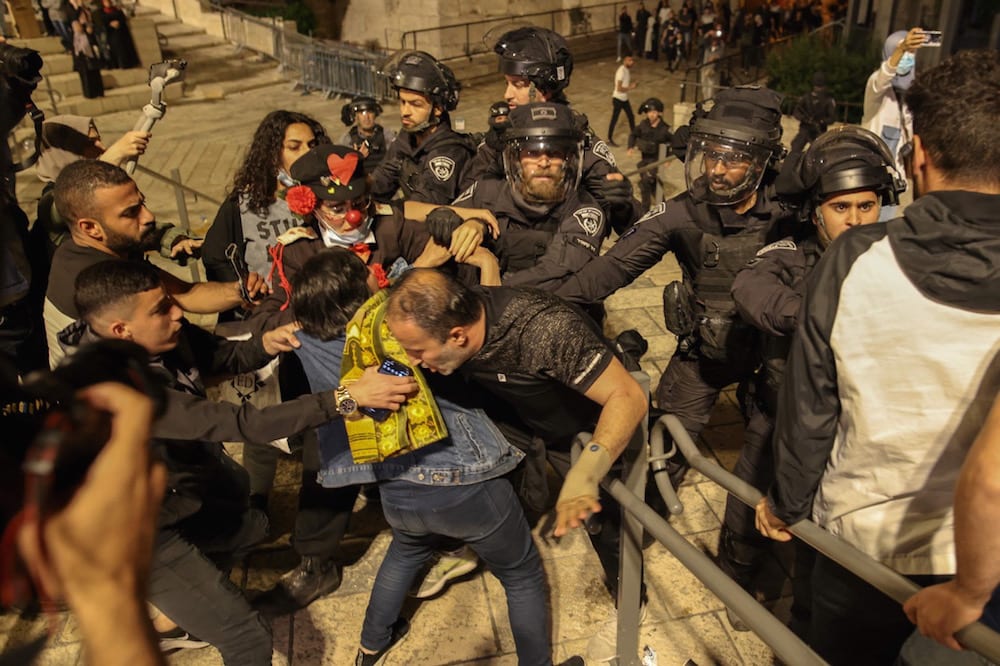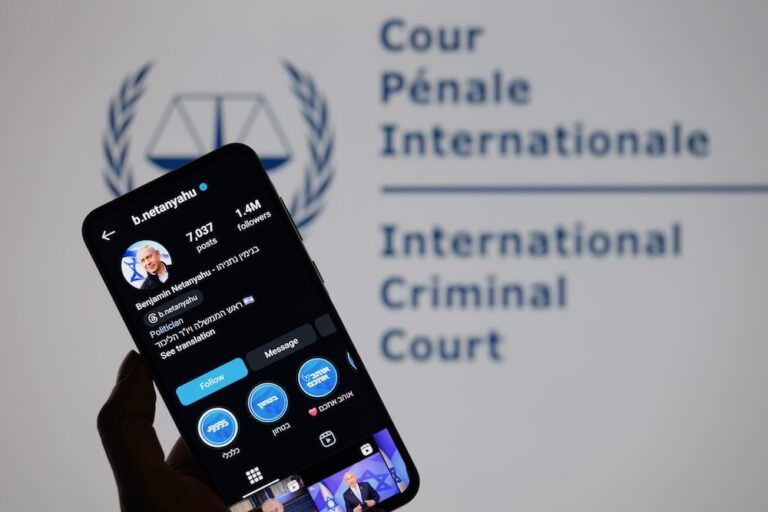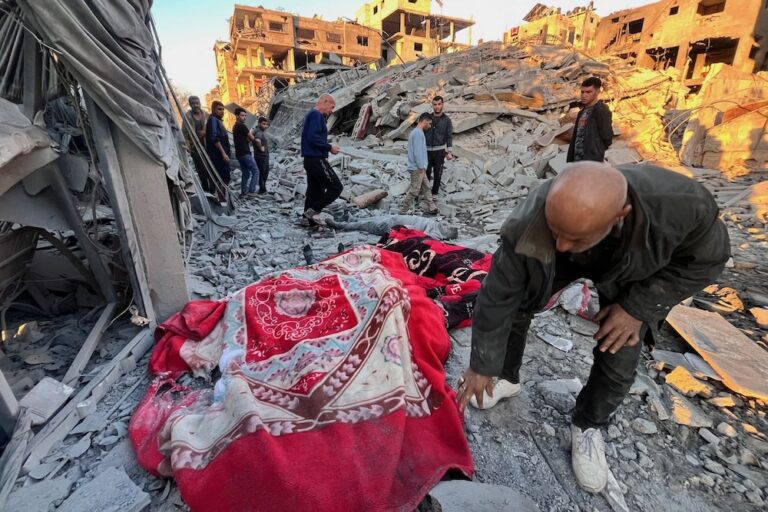April 2021 in Middle East and North Africa: A free expression roundup produced by IFEX's Regional Editor Naseem Tarawnah, based on IFEX member reports and news from the region.
Palestinian protesters battle barricades, forced displacement, and cyber-espionage. Fake news laws target journalists and activists throughout North Africa. The impact of Egypt’s prison-industrial complex. And how Syria became a black hole for media workers.
Palestine: Apartheid, forced displacement and cyberattacks
Human Rights Watch (HRW) released a defining report that concluded for the first time that Israel is committing crimes of apartheid and persecution against Palestinians in the occupied territories. Drawing on years of documentation and testimonies, the report highlighted how Israeli authorities have used draconian military laws to suppress non-violent activism, targeting Palestinians for their “anti-occupation speech, activism, and affiliations, jailing thousands,” as well as banning hundreds of civil society organizations, and shutting down dozens of media outlets.
Israel’s suppressive tactics have been on full display in recent weeks with Israeli forces using excessive force to disperse protests in Jerusalem’s eastern area. Young Palestinians protested Israeli incursions on public spaces under the guise of COVID-19 restrictions, including denying entry to worshippers at Al Aqsa mosque during Ramadan and erecting barricades to ban traditional gatherings around the Damascus Gate plaza. Israeli forces in riot gear used stun grenades and vehicles spraying foul-smelling ‘skunk water’ to disperse protesters. Tensions culminated in clashes with far-right Israelis who held racist anti-Arab marches in the city.
With authorities eventually removing the barricades, Palestinian protesters mobilized toward the nearby Sheikh Jarrah neighbourhood whose residents are being evicted from their homes. In the context of ongoing forced displacement of Palestinians in the occupied territories, an Israeli court order setting a deadline for the mass eviction of Palestinian families in the East Jerusalem area spurred widespread solidarity with its residents’ plight, resulting in Israeli forces violently cracking down on demonstrators.
Meanwhile, Palestinian journalist Alaa al-Rimawi was forcibly disappeared from his Ramallah home last month. Rimawi, whose work has highlighted the status of journalists jailed by Israeli authorities, was held under administrative detention and launched a hunger strike to protest his arrest.
Marking this year’s World Press Freedom Day, IFEX member Mada Center brought attention to the 17 Palestinian journalists held in Israeli prisons, and called on the international community to exert more pressure on Israel to stop its attacks on Palestinian media workers, and bring perpetrators to justice. The organization also noted the responsibility of Israeli authorities for at least 53% of violations committed against Palestinian journalists last year alone.
Palestinian journalists and civil society have also been subject to repression at the hands of Palestinian authorities. In a month that saw President Abbas cancel the first elections in 15 years, a Facebook report accused the cyber wing of the Palestinian Preventive Security Service of operating “rudimentary hacking operations” consisting of some 300 fake or compromised accounts that targeted roughly 800 people, including journalists, activists, and dissidents. While local rights groups condemned the cyber-espionage and called on authorities to hold those responsible accountable, shaping a safer online environment for Palestinian civil society will also require holding Facebook accountable for its ceaseless track-record in removing pro-Palestinian content.
North Africa: Hunger strikes and fake news
In Morocco, imprisoned journalists Omar Radi and Soulaimane Raissouni launched hunger strikes in recent weeks to call attention to their unjust detention. The rapid deterioration of their health prompted outcry from civil society and brought attention to the state of press freedoms and right to free expression in the country. Their imprisonment is part of a larger repressive campaign targeting journalists and activists critical of authorities, holding them on dubious charges, delaying their trials, and denying bail. Radi’s worsened health forced him to end his hunger strike after three weeks, while Raissouni continues his protest as of this writing. Meanwhile, YouTuber Chafik Omerani was released after serving a three-month sentence for his critical videos. Omerani spent 89 days of his sentence on a hunger strike.
In Algeria, anti-government Hirak protesters faced increasing state repression and an uptick in arrests, with at least 23 detained activists launching hunger strikes to condemn their unjust arrest. Journalist Abdelhakim Setouane, who has been in detention since October 2020, was handed a six-month prison sentence on defamation and “false news” charges for his critical reporting of public officials. Journalist Rabah Karèche was also detained recently on “false news” charges and faces a two- to five-year sentence for his reporting on land-use protests by tribal communities in the country’s southern region. These cases are emblematic of a growing trend in the wider region of governments using vaguely-worded laws to criminalize online free expression, framing legitimate criticism and reporting as “fake news”.
In neighbouring Tunisia, rights groups condemned a police attack on journalists at the headquarters of the country’s national news agency, Tunis Africa Press (TAP). Journalists were holding a peaceful sit-in to protest a controversial political appointment as TAP’s director general, which the government later rescinded in a welcomed move.
Egypt’s unrelenting prison-industrial complex
A report from IFEX member the Arab Network for Human Rights Information (ANHRI) detailed the country’s expansive prison system, and how 35 of its prisons were built over the past decade to detain an estimated 65,000 political prisoners. The report also examined the myriad violations perpetrated against prisoners, depriving them of food, supplies, and medical care, as well as using legal mechanisms to hold them in seemingly indefinite pretrial detentions.
Jailing family members has also become a common tactic in suppressing criticism, especially with regards to prison conditions. Authorities detained the father, mother, and sister of jailed activist Abdul Rahman Al-Shuwaikh recently, after his mother publicized her son’s allegations of sexual assault and torture perpetuated by prison authorities.
Underscoring the dire state of Egypt’s prisoners, authorities carried out the mass execution of 17 people convicted over an attack on a police station in 2013 that killed several officers. According to Amnesty International, executions in Egypt have risen dramatically in recent years, with the country overtaking Saudi Arabia to become the world’s third biggest executioner.
Rights groups have drawn increased attention to the deteriorated state of human rights in Egypt and its thousands of prisoners of conscience in recent weeks. IFEX joined over 20 organizations in calling on the European Bank for Reconstruction and Development to address the regime’s rights record ahead of bank president Renaud-Basso’s visit to the country. According to the open letter, the escalating human rights abuses represent a non-compliance with the bank’s mandate on multiparty democracy and pluralism.
Rights groups also put pressure on the Biden administration to change course in its annual $1.3 billion military assistance package to the country by compelling the regime to improve its rights record, and emphasizing Biden’s campaign promise of “no more blank checks for Trump’s favorite dictator.”
As Egypt continues its crackdown on critics and their family members, recent weeks also saw the release of journalists that faced “fake news” charges including Khaled Dawoud, Solafa Magdy and Hossam Sayyad.
In Brief
Bahrain’s prisoners of conscience continue to be put at risk amidst a COVID-19 outbreak in the country’s prisons. Despite releasing dozens of prisoners, including prominent figures like 75-year old activist Mohammed Jawad Parwiz, appalling prison conditions continue to threaten the lives of prisoners like human rights defender Abdul-hadi Alkhawaja. Detainees peacefully protesting their poor prison conditions and lack of access to medical treatment at Jau prison were met with excessive force at the hands of authorities who used stun grenades and beat detainees on their heads, spurring outcry from UN officials. Dozens of the detainees were isolated in the prison and have not been alowed to communicate with their families and lawyers. Meanwhile, families of the detainees continued to hold nightly demonstrations to call for their release.
A court’s recent sentencing in Iraq Kurdistan of three journalists and two activists to six years in prison was based on deeply flawed proceedings and insufficient evidence, according to HRW. Jailed for allegedly participating in protests against the regional government, the men were reportedly detained incommunicado for months, without access to a lawyer.
New & Noteworthy
In Syria, media and journalists faced violations against their work an average of once every three days, reveals a new report from IFEX member the Syrian Center for Media and Freedom of Expression. The report, titled “Syria: Black Hole for Media Work”, is the result of a ten-year documentation process by dozens of monitors in the country, who recorded 1,992 violations against the media and media workers between March 2011 and the end of 2020.
This year’s Reporters Without Borders (RSF) World Press Freedom Index examines how governments in MENA have used the pandemic to reinforce existing methods to stifle journalists and the press, at a time when information is critical to public health.
Lastly, Palestinian film ‘The Present’ was celebrated online after winning a British Academy of Film and Television Arts (BAFTA) for best short film last month. The film, which also garnered an Academy Award nomination, depicts a Palestinian man and his young daughter, who must brave Israeli soldiers and checkpoints in their efforts to buy a gift for the man’s wife on their wedding anniversary. Receiving the award, filmmaker Farah Nabulsi thanked “the people of Palestine, for whom freedom and equality is long, long overdue”.



